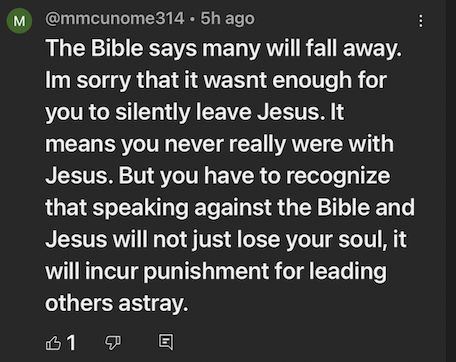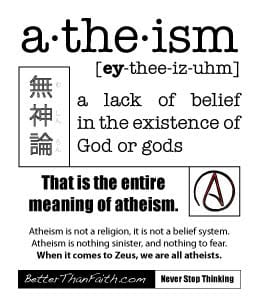
Dr. David Tee, whose real name is Derrick Thomas Thiessen, shares with his readers how to reach sinners, unbelievers, and atheists for Jesus. What follows are quotes from his recent posts. These should give Christians and unbelievers alike a snapshot of how he interacts with and responds to unbelievers.
Maybe he’s not interested in evangelizing sinners as much as he is being right. This doesn’t surprise me. Christian Fundamentalists like to talk about winning souls for Christ, but it seems to me that what they really care about is being absolutely right.
Let me know you think in the comment section.
Dr. David Tee, In His Own Words
Unbelievers like taking common and legitimate aspects of writing and distorting them into something they are not.
BG at the end of his post gets upset that we have ‘impugned’ his character. Yet, he should not do it to God if he doesn’t want to have it done to him.
Another misunderstanding and misrepresentation of God and his actions.
Another wholesale misrepresentation and a personal attack thrown in.
Another misrepresentation and distortion. BG generalizes the commands to make his point, which undermines his credibility and ruins his honesty. He is not being honest even after being told the correct explanation about God’s commands.
The unbelieving moral standard is inferior and allows for sin and corruption to flourish.
The unbeliever is not in any position to judge God and His commands. Their idea of morality is worse than what they accuse God of being. Their definitions of the acts commanded are just as subjective and fluid as their moral code. The unbelievers’ moral code is not infallible nor omnipresent like God’s.
Not one of those accusations thrown against God is true.
At this point, we stop responding and addressing the falsehoods and misrepresentations written by BG. At the end he makes this claim that he has not murdered or raped so he must be a good man and we are impugning his character. Our response to that silly claim is HA HA HA HA HA HA HA!!!!
He does it to himself by purposefully lying, misrepresenting the facts, the Bible, God, etc., distorting the topics, and being dishonest in his points. We are not impugning his character but pointing out where he is wrong. Which we are allowed to do.
The only way to continue these types of discussions is if the unbeliever is honest, has an open mind, and will listen to your facts honestly and sincerely. Close-minded people like BG and MM only hear what they want to hear, then look for ways to misrepresent what was said.
Speaking of MM, he wrote a response to our mind your own business and his only point was– ‘I will write on any topic I want to’– such a stubborn, close-minded individual who does not get the fact that what he has to say means nothing because he is not qualified to speak on many topics.
They do not use all the facts, just the ones that support their deceptive point of view. They are not honest.
it is not the Christian who is ignorant, but the unbeliever who does not do very good research and only cherry picks the information they will use in their faulty attacks on God, the Bible and Christians.
When believers say things, it is often the case that unbelievers will ‘fact-check’ them. Then when the fact check turns up different information, they label Christians as liars.
This is another lie, as using corporal punishment is not beating a child or a student. But BG will not agree with that as he seeks to paint a false picture of us and what we believe. We could say that Bg does not care about innocent teachers or that teachers are being assaulted in the classrooms just by using his logic, but we won’t.
BG should know better than to lie about us, especially when he was not there nor knows anything about the topic he writes.
What a crock!!!!!!!!!!!!!!!!!!!!. This discovery only says that despite their claims to be rational and logical, scientists are great fairy tale writers.. They spin a good yarn that deceives millions of people, and that is wrong.
The scientists are not getting to the truth at all, but making everything up as they go.
But unbelievers like to think they get to dictate who will do what and do it according to their views. They forget there are others in the world who have the same rights and do not want them infringed upon.
This is another headline we came across, and we know the author [Bruce Gerencser] likes to word his headlines in a way that distorts what is going on.
The unbelievers’ solutions have been to remove God, prayer, specific punishments, and other similar aspects of school life and replaced them with ideas that do not work.
This is another ridiculous thing to say, as the unbeliever takes them out of context and misapplies them to whatever troubling thought they have on their minds. The unbeliever writing those words has no concept of what human flourishing means as he wants sin and corruption to abound at the expense of those doing what is right and moral.
But the unbelieving writer [Bruce Gerencser] of those quoted words does not care if he writes the truth or not. He just wants to justify his departure from God. He also wants to misdirect people’s attention away from what the unbelieving world is doing.
Anything that the writer accuses God of doing, his side of the world is doing with less than holy and pure motives, and on a far grander scale. He and other unbelievers are in no position to accuse God of anything.
Unbelievers do not make distinctions between true and false preachers/teachers. They lump everyone into one category, then continue to make false accusations against all Christians.
Only in the minds of unbelievers and atheists is this done. They always need something to fuel their hatred of Christ, even by exploiting the nonsense spoken by false teachers.
Unbelievers and atheists will go to any length to justify their decision to reject the offer of salvation, even by extrapolating false claims made by false teachers to others not guilty of doing such a thing.
If they [unbelievers] were honest, they would separate the true from the false teachers and be more open-minded to the former while closed to the latter. But rarely are unbelievers and atheists honest when it comes to Christ, Christians, and those who pose as Christians.
These comments can be labelled as ‘they will never learn’, ‘they will never listen’, ‘they will complain no matter what’, and by they we mean unbelievers and atheists. We like to distinguish between the two even though they are all categorized under the unbelievers label.
Ignoring is the best option because unbelievers and atheists rarely accept the truth as the answer.
Unbelievers continue to deny God the right to punish people and animals for their disobedience, even though they do the same thing as parents or supervisors, etc. They will punish people for violating their rules or the rules of a company, which affects the loved ones and animals of those punished.
The unbeliever and atheist fail to see the entire side to these issues they complain about. They only want to have their desired results, even though it leaves sin and crime sin place. In their complaints, there is no option to punish those who disobey or commit crimes. The sinner is free to act as they will without fear of physically paying for their crimes.
Also, the unbeliever and atheist will attack and punish those who are living by the rules, making them nothing but toothless hypocrites. They will do exactly what they complain about and act the same as God acts. Only the target is different.
The unbelievers go after those who disagree with/disobey their views and rules and condemn themselves by the very complaints they make against God. Their complaints hold no water and do not lead anyone to a better way or paradise.
Leave it to unbelievers to get the opposition to trans ideology and practice wrong, and then twist it into something it is not. This is what MM [Ben Berwick] has done with his recent post.
No religious right individual or organization are attacking trans people. They are trying to relieve them of the delusions that enslaves the latter. There is no right for fake women to invade real women spaces. There is no right to call themselves women when they are not.
The only small minded bigots we find are trans people. You can see their bigotry any day of the week as it is recorded endlessly in the different news cycles as well as other media outlets.
He [Ben Berwick] deludes himself, as do many others, into thinking he is right when all he is doing is helping erase the lines of right and wrong, and what is defined as sin. He leads people to sin and that is wrong.
Bruce Gerencser, 67, lives in rural Northwest Ohio with his wife of 46 years. He and his wife have six grown children and sixteen grandchildren. Bruce pastored Evangelical churches for twenty-five years in Ohio, Texas, and Michigan. Bruce left the ministry in 2005, and in 2008 he left Christianity. Bruce is now a humanist and an atheist.
Your comments are welcome and appreciated. All first-time comments are moderated. Please read the commenting rules before commenting.
You can email Bruce via the Contact Form.








